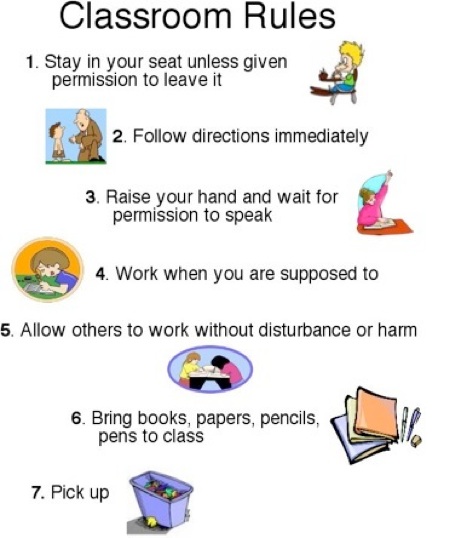
Classroom policies regarding technology, academic honesty, and behavior help students form initial impressions of the tone and expectations for a course. Research into the impressions of classroom policy on students is ongoing, but suggests that students perceive instructors to have significant control over the fairness of classroom policies. Be clear about technology rules. Classroom tech can be a huge distraction if kids don’t know the rules. Use our free posters to set expectations; set a clear cell-phone policy as well. Have a system for pencils. Classroom Management Rules and Expectations Improve Learning There’s no doubt that the clearer the rules and expectations are, the more likely students will be to learn. Rules define the parameters of behavior for students, so they know what’s expected of them and also what behaviors are “out of bounds.”. Jul 28, 2016 I recently blogged about how I created policies and procedures that incorporated character education in my classroom. My post also includes a checklist of policies and procedures that teachers can use when planning for the new school year. Use this checklist as you review your own policies and procedures for the upcoming school year if. Read More about Classroom Policies and Procedures.
Classroom rules for primary and middle school students are important because a lot of young students take time to learn how to behave in classrooms.
Having classroom rules gives students a sense of structure and routine and helps them realise that there are certain things one must do when within a classroom.
1. Inside Voices – Tell your students that when they are inside the classroom, they must use clear but moderate voices. Outside the classroom, they are welcome to scream and shout, as long as they do not disturb anyone.
2. Raise Your Hand To Answer/Ask A Question – In their eagerness to answer or ask questions, students sometimes tend to blurt out answers and some students might do this more than the others. Give your students three passes. Hands must be raised to ask questions or answer questions. Every student gets three waivers for answering out of turn or asking questions without raising their hand. Once their three waivers are done, for every question or answer that is said out of turn, the student loses a minute of game time.
3. Be Respectful, Not Rude – This is one of those classroom rules that can be hung up around the classroom. Younger students usually do remember to be respectful, if there are reminders hanging around them. Occasionally they might forget their manners in their haste to get their point across but gentle reminders will always set them back on track. If a few students are consistently rude, you can either take away privileges or not acknowledge them until they ask the same thing, politely.
4. Be Punctual, Not Tardy – Punctuality is one of those qualities which children need to learn early on in order for it to become an ingrained habit. Give your students a time limit of 5 minutes before you enter class in order to be in their seats and have their books out. Tell them that if they take more than five minutes to set up their materials, they will lose some game time, or even free time or receive extra homework.
5. Bring Your Own Materials, Don’t Borrow Materials – Students need to be told that they cannot borrow study materials and stationery
from other people all the time. Tell your students that borrowing once or twice is okay, but if they keep borrowing things, or come to class unprepared, they will have to change their place and sit right up in front with you, under your nose and also that you will send a note to their parents. For students who might not be able to get stationery or books (because of personal reasons, like not being able to afford them or owing to family problems) you can keep a few extra materials with you that you can hand out to those students who need them.
6. Enter and Leave The Classroom In A File – For younger students, especially primary school students, getting out of the classroom can be an exercise in patience because any opportunity to play outside is met with nothing but anticipation. Tell your students that they don’t need to maintain order outside on the playground. However, they do need to file in and out of the classroom in a straight line in order to get to the playground. There will be no going to the playground or going home until they leave the classroom in an orderly line.
Classroom Policies And Procedures High School
7. No Kicking, No Screaming, No Pinching And No Biting – This rule does not apply to children in grades above the second. However, children who are in kindergarten and first grade tend to not realise that kicking/punching/biting/screaming are not acceptable behaviours. Young children sometimes engage in aggressive behaviour because they do not know how to get their point across or are frustrated. Some children engage in these behaviours because they tend to behave the same way even at home. When you see student of yours behaving like this, keep them in time out, or have them sit next to you of in case of constant aggressive behaviour, talk to their parents.
Classroom Policies Examples
If you find these classroom rules helpful and do utilize them in your classroom, do let us know how things worked out. If you have other classroom rules that you use, do share them with us in the comments section below!
